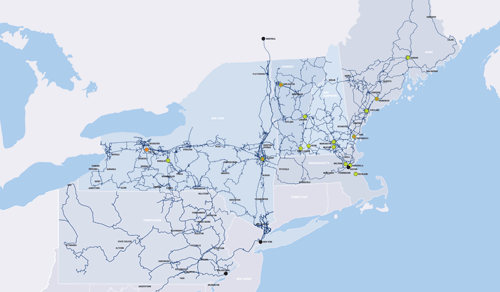
Town, city, and state governments use closed-circuit TV (CCTV) cameras to monitor traffic and prevent, detect, and solve crimes. Some municipalities, such as Attleboro, MA, have even encouraged homeowners to register their surveillance cameras so the footage can be used as evidence in investigations.
However, the significance of surveillance camera footage isn’t always immediately apparent, so video needs to be backed up and archived. It may take law enforcement officers days or weeks before they realize that a surveillance video camera may have captured images of a crime in progress, a suspect, or a missing person.
If the video isn’t archived, it may be overwritten, destroying any evidence.
Municipal governments can use cloud storage to archive and protect video camera footage and optimize the transmission of video files with managed edge and SD-WAN.
The Challenges of Archiving Surveillance Video
 Surveillance cameras must run 24/7 to be effective. You’ve probably seen at least one episode of a crime television show where detectives went to a store to view surveillance camera footage only to learn that it wasn’t working on the day in question.
Surveillance cameras must run 24/7 to be effective. You’ve probably seen at least one episode of a crime television show where detectives went to a store to view surveillance camera footage only to learn that it wasn’t working on the day in question.
When a camera runs all day every day, it produces a lot of footage. Footage may need to be archived for 30 days or longer. Today’s high-resolution cameras make archiving footage even more challenging by using higher frame rates, increasing the amount of data that must be stored.
To be effective, surveillance footage must be easy to access and retain. Accessing the footage is necessary for review and analysis, whether for crime detection and enforcement or for gathering data on traffic patterns.
Keeping Surveillance Video Footage Secure
City and state governments must meet Criminal Justice Information Services (CJIS) compliance regulations to protect national security. For this reason, any method used to store surveillance camera footage needs to meet CJIS compliance. CJIS maintains databases for information needed to apprehend criminals and monitor criminal activity.
Municipal governments must meet standards for data security and encryption when handling surveillance videos. CJIS standards include:
- Multi-factor authentication
- Regular audits and reviews
- 128-bit encryption or better
- Complex decryption keys
All these criteria can be met by CJIS-compliant and encrypted cloud storage. In CJIS-compliant cloud storage, FIPS 140-2 validated encryption is available for data in transit and FIPS 197 encryption protects data at rest. Security policies ensure access to data is limited to those who are only authorized to know certain information.
Taking It From the Streets to the Cloud
 Surveillance video needs to be protected while in transit. CCTV cameras are endpoints, located at sites far from government buildings and cloud data centers. While video data is in transit, it is vulnerable to being intercepted by criminals.
Surveillance video needs to be protected while in transit. CCTV cameras are endpoints, located at sites far from government buildings and cloud data centers. While video data is in transit, it is vulnerable to being intercepted by criminals.
Managed edge routing and security solutions allow state and local governments to monitor and control access to the wide area network (WAN). Video files move to cloud storage safely, protected by tools such as intrusion detection and prevention systems, identity-based firewall, and malware threat intelligence.
When managed edge is used to protect a fiber optic network, even high-resolution video can be transmitted to the cloud quickly without experiencing latency.
Software-defined WAN (SD-WAN) also helps to optimize the transfer of video files into the cloud. A centralized dashboard makes deploying and managing the WAN easy. SD-WAN enables automatic fail over for the backup and recovery of surveillance video files.
Keeping Municipal Government’s Eyes Wide Open
A state and local government’s surveillance system is only as good as the storage and backup system it uses to archive and protect its camera footage. Backup records need to be kept so that potential evidence is preserved when on-site camera footage is overwritten.
FirstLight has storage and networking solutions designed to meet the video file archiving and transmission needs of government agencies. We offer managed edge routing and security to protect video files as they move to the cloud. Our cloud storage options meet CJIS compliance standards for encryption and authorization. We can also customize SD-WAN solutions to meet the needs of government agencies.
Read about how FirstLight helped the New Hampshire Judicial Branch upgrade its data center and connectivity. Check out our case study.





















